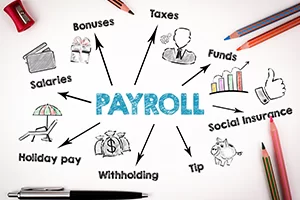
Business Advisory Services
Everything you need to help you launch your new business entity from business entity selection to multiple-entity business structures.
Table Of Contents
 By Jason Watson, CPA
By Jason Watson, CPA
Posted Sunday, December 29, 2024
In this section we will discuss establishing the salary amount, payroll cadence, tax planning and withholdings, and adjustments.
We’ve discussed the theory behind calculating a reasonable S Corp shareholder salary in another chapter. You are also aware of the benefits of an S corporation such as K-1 income being taxed at the income tax level only, and not subjected to payroll taxes such as Social Security, Medicare, unemployment or disability taxes. This is one of the reasons you are using an S Corp election (probably the only reason).
As the theory of S Corp salary suggests, the amount to pay as a reasonable wage is dependent on you but also on the health of the business. Here’s what we do at WCG-
Another consideration is a late S corporation election with equally tardy payroll events. Let’s say it is October and we want to go back to January 1 with a late S Corp election, and we also establish a reasonable shareholder salary of $60,000. There are only 3 months remaining, so each month will be $20,000 in salary amounts to account for the entire year. There might be some tinkering with the cash needs if you’ve already paid a bunch of estimated tax payments for the year.
WCG recommends processing shareholder payroll for your S corporation monthly unless you already have a team on a payroll cadence such as bi-weekly or semi-monthly. Some accountants will simply run S Corp payroll once a year in December. In our opinion, this is bad for three big reasons-
Estimated tax payments change as well when you have an S Corp, especially the first year. Generally, you are required to pay at least 100% of your prior year tax liability or 90% of your current year tax liability whichever is lower. If you earn over $150,000, you must pay 110% of your current year tax liability. How do you keep that straight?
Here is some more WCG elegance (yeah, we’re bragging a bit)- we calculate and pay your quarterly estimated tax payments through your payroll withholdings. No more writing separate checks or using online payment portals, and tracking due dates. We do this by manually entering your federal and state withholdings accordingly to reflect the tax liability for your W-2 income and your K-1 income, plus other household sources. Beauty!
Technically we are not paying estimated taxes, but we are sending money off to the taxing agencies via payroll.
For example, let’s say you have a net ordinary business income (profit) after expenses and deductions before shareholder salaries of $150,000 and a reasonable salary of $60,000. From there, we look at all household income sources such as your spouse’s income and withholdings, rental income, pension income and anything else that is material to your tax world.
Then we create a mock tax return (the tax plan). That’s right! We extrapolate all this data, pump it into a tax return and determine your tax obligations. We do this periodically throughout the year. Nothing is as accurate as a mock tax return. Yes, you can use Excel or other online estimators, but a tax return is the best tool.
Then we crunch some more numbers. Here is a summary from our internal work paper with some assumptions-
| Taxable Income | 184,718 |
| Income Tax Calculation | 33,606 |
| Less Other Withholding Sources | -8,000 |
| Household Tax Deficit | 25,606 |
| Less W-2 From S Corp | -26,500 |
| Less Estimated Tax Payments | 0 |
| April Tax Obligation (Federal) | -874 |
What the heck are we showing you here? The taxable income is making some assumptions such as spousal income, itemized deductions, exemptions, etc. The $184,718 is just a number. Please accept as is.
The tax related to this income is $33,606 according to the mock tax return and your spouse has withheld $8,000 on his or her W-2. The resulting house tax deficit in this example is $25,606. If we simply entered $60,000 into the payroll system and let payroll tables figure out the withholdings it might come up with $7,000ish. This would be a tax surprise in April since you would owe $18,000ish. Yuck. Bad news is OK. Surprises are bad.
This is because the payroll computer does not know about your K-1 income. The net ordinary business income after expenses and deductions from your S Corp tax return. Generally, when you have multiple income sources, especially ones without a withholding component such as K-1’s and rentals, relying on payroll tables to determine withholdings is woefully inaccurate.
You could also have income disparity. For example, let’s say you earn $150,000 and your spouse earns $30,000. When your spouse’s employer computes tax withholdings, the payroll system does not understand that the household income is $180,000. It can only make basic assumptions. In this disparity, even if the $30,000 spouse claims 0 exemptions on a W-4 (max withholdings), the taxes withheld will not be enough when combined with the $150,000.
Our tax planning and income tax withholdings adjustments fix this.
To summarize, we compute your household tax liability and subtract external withholding sources to determine the amount of tax to be withheld from your S Corp payroll. No more estimated payments (usually). No more underpayment penalties. This is a nice way of reducing some chores in your world.
There are various payroll adjustments throughout the year. Let’s say you onboard with WCG in February. We are going to do a quickie calculation of the reasonable salary and income tax withholdings to get things launched. However, in May, June or July (tax planning months) we are going to dig into the details, prepare the tax plan and make an adjustment to your payroll processing.
Another common scenario is where you might not be able to accurately predict your business activity for the year. For example, a real estate agent in March has no idea how much he or she will earn for the year. But in October and November, there is enough history to predict the future. What we do with this is use a small salary such as $500 per month to check the box, and then make adjustments in July and certainly in November.
Yet another situation is the S Corp owner who is experiencing rocket growth. If we use the previous year as a proxy for the first half of the next year (which is common), a large adjustment must be made in July to account for the growth. The adjustment is not necessarily about salary as it is about tax planning and income tax withholdings.
A common question is “Does it look bad if my salary changes throughout the year?” The answer is simply No. Think of sales and commissions or bonuses. Many professionals and other employees see varying incomes throughout the year. Also, the IRS looks at things in aggregate, and assumes that income and taxes withheld were evenly paid throughout the year. Big swings in income from year to year is certainly a trigger for audits, but a mid-year salary adjustment is not that.
Our goal is to increase income tax withholdings to account for your overall household tax obligations. However, there are times when this doesn’t work well, and separate estimated tax payments are necessary. There are two primary reasons for this.
First, you have a low salary relative to your solo 401k plan contribution. For example, a reasonable shareholder salary of $36,000 is determined. You are 52 years old, and want to defer $23,500 (for the 2025 tax year) plus catch-up of $7,500 for a total of $31,000. That leaves $5,000 for Social Security, Medicare and income tax withholdings. Never going to happen, so a separate estimated tax payment will be needed.
The other reason is similar to the above; your shareholder salary is low compared to your K-1 (which is net ordinary business income after expenses and deductions). For example, your W-2 is $100,000 but your K-1 is $500,000. Yes, you have employees so you are not being limited on the Section 199A qualified business income deduction. No, you don’t have enough “room” on your paycheck to increase income tax withholdings to cover the taxes associated with $600,000 in gross income. Even if your effective tax rate with the IRS and the state was only 20%, which is low, it still doesn’t work with a $100,000 W-2.
We addressed these issues in Chapter 4. Please review. Here is a summary of the topics-
We wanted to throw this at you as well. Shareholders must be paid a salary before any shareholder distributions are paid out or loans are advanced to shareholders. This requirement is a technicality. You can take a shareholder distribution as an S Corp owner prior to paying a salary to yourself throughout the year. At the end of the year, however, you must have W-2 income if you received shareholder distributions.
If the business cannot afford to pay salaries, it is not necessarily required to do so. There is some gray area involving large depreciation expenses and other non-cash reductions in business income. So, if you have a pile of cash but experience a loss due to large depreciation, for example, you might still be required to pay salaries. If you believe your business won’t be profitable, then we suggest deferring the S Corp election to another tax year. Remember there are provisions allowing a late S Corp election beyond the customary 75-day limitation- take advantage of this option by delaying your election if you are unsure.